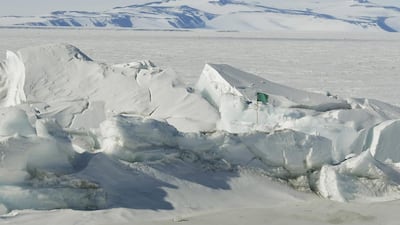New York University have received a US$2.1 million (Dh7.7m) grant from the United Kingdom’s National Science Foundation to research the factors contributing to the rise in sea levels.
The research will be carried out on the Western Antarctic Ice Sheet by NYU's Environmental Fluid Dynamics Laboratory and NYU Abu Dhabi Centre for Global Sea Level Change, which are both directed by NYU-AD professor David Holland.
The grant is part of the new US$25 million International Thwaites Glacier Collaboration, overseen by the United Kingdom’s Natural Environment Research Council and the National Science Foundation.
The Thwaites Glacier is several kilometres deep and covers an area the size of Britain. It has already drained a mass of water that has accounted for approximately 4 per cent of global sea-level rise.
“Thwaites Glacier is the most likely candidate to make sure a large contribution to sea level change in a relatively short period of time,” said Dr Holland. “Decades of discoveries, from observation to theoretical, that all come together and point to this glacier as kind of a key place to study.”
Scientists will gather the data to understand whether its collapse could begin in the coming decades or centuries.
It is possible that the glacier could contribute to a one-metre rise in sea levels over the next century, putting coastal cities like Abu Dhabi at risk.
“In the US, it would be called clear and present danger, meaning it’s not clear it’s going to happen but there’s something here to investigate,” said Dr Holland
Dr Holland and Keith Nicholls of the British Antarctic Survey will lead the research team. They will study how the ocean is melting the glacier at the grounding line, the zone where the glacier comes into contact with the sea, and the rate at which this is happening.
“The Thwaites Glacier is a very long way away from either US or the UK bases and it’s very difficult to organise getting a field team onto the glacier,” said Dr Nicholls. “I think the main revelation to us has been the importance of this process going on at the grounding line and our project is all about understanding these processes.”
The grant will cover the significant expense of researching in the unpredictable and remote area. There is a short window of operation between December and January.
______________
Read more:
How NYUAD research hopes to predict crucial changes to India's monsoons
Abu Dhabi scientists' study of shrinking glaciers is subject of new film
As he readies for retirement, Al Bloom reflects on a remarkable decade at the helm of NYUAD
______________
Critical modelling and analysis based on the project’s findings will be carried out at NYUAD.
“Rising sea levels are a globally important issue that cannot be tackled by one country alone,” said the UK science minister, Sam Gyimah. “The Thwaites Glacier already contributes to rising sea levels and understanding its likely collapse in the coming century is vitally important."
William Easterling, assistant director for the National Science Foundation’s Geosciences Directorate, said: “The challenges of conducting fieldwork of this scope and scale in such remote locations are enormous. The only practical way for nations to do this is to work collaboratively, each bringing their resources, both scientific and logistical, to enable complex and comprehensive field studies.”

